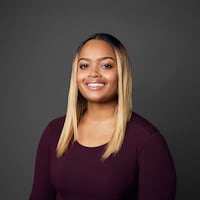Celebrity advocates for HIV, clinicians and community leaders facilitated a forum on creating awareness for the impact of HIV in Black communities during a panel at The Gathering Spot on Thursday night. The event was in honor of World AIDS Day.
Georgia is the leading state in the country for new HIV infections, according to 2020 data from the CDC. And despite Black people only representing about 32% of the state’s population, they make up about 72% of HIV infections, according to a 2020 report from the Georgia Department of Public Health.
Justin Smith, an Atlanta-based HIV/AIDS activist and the director of the Campaign to End AIDS, said the city ranks among the top metropolitan areas for new HIV diagnoses.
“There’s an expression that we say in the city which is that Atlanta influences everything, and so how powerful would it be if Atlanta could influence the end of the HIV epidemic?” Smith said. “I hope that that’s the work that we can begin in this world tonight.”
Thursday’s event, titled “Creating Equity, Taking Action: A Community Conversation about Ending the HIV Epidemic in Black Communities” was sponsored by Urban One and Gilead Sciences, a biopharmaceutical company whose work includes developing antiviral medication for treating HIV/AIDS. Kandi Burruss, reality TV star and business mogul, helped moderate the discussion and emphasized the need for everyone, regardless of sexual orientation, to get tested.
“The sooner you can get tested and find out, the better quality of life that you can possibly have,” said Burruss, 46. “I’ve definitely had a person who was close to me (have it) and they did not do their due diligence to start taking their medications early on and it did affect them just because you open yourself to other things outside of HIV because your immune system is weakened.”
Along with starring in Bravo’s “The Real Housewives of Atlanta” and owning restaurants across the city, Burruss is also the owner of the luxury adult toy brand Bedroom Kandi. She previously hosted Kandi Koated Nights, a popular web series that celebrated sex positivity. Burruss said more Black women need to understand the importance of knowing their HIV status.
The rate of Black women in Atlanta living with HIV is about sixteen times higher than that of white women, according to AIDSVu, an online mapping tool developed by Emory University and Gilead Sciences that visualizes data on the country’s HIV epidemic.
“For Black women, a lot of the times, we don’t realize, statistically, we are the main ones who’ve been hit hard in the fight against HIV, so I think that’s another thing that people need to recognize. One of the people who’s close to me and actually acquired HIV in the 90′s (and) who was a part of my family was a woman and that was a time when people labeled it as a gay man’s disease, so I knew early on that that was not the case.”
Queen Hatcher-Johnson, who works as the gender-inclusive program manager at Positive Impact Health Centers across the state, disclosed her HIV status at the event and suggested that those living with HIV should be selective when choosing to share because of their safety.
“I am 55 years plus,” Hatcher-Johnson said. “As a Black trans woman, that is something that you do not achieve. ... I’ve been married. I am very successful. I will not allow my Black community to disenfranchise or dehumanize me as an individual, so I would encourage people to share their status on a need-to-know basis. Do you really need to know when you first meet me that I am HIV positive? No. Does my family have the right to know? I don’t think so because some families in the Black community do a lot of things to demonize and ostracize and weaponize individuals with HIV, so I would not tell you that once you’re diagnosed to run to your families. Run to your silos, run to whatever way you choose to get to that place of peace and then share.”
Credit: Daniel Varnado
Credit: Daniel Varnado
Other celebrities and influencers from Thursday’s discussion included television personality Dr. Contessa Metcalfe, actor and activist Miss Lawrence, radio host Gary with da Tea, and athlete Byron Perkins. In October, Perkins, a defensive back for Hampton University, became the first football player from a historically Black college and university to publicly announce his identity as a gay man.
Although Perkins said he’s working on ways to navigate being an advocate for LGBTQ+ athletes, he thinks its essential that people living with HIV know that they are supported.
“They need to know that they are loved more than anything,” said Perkins, 22. “Secondly, Atlanta residents need to understand that this is a hot zone for HIV, so understanding the risk is imperative. Understanding that your life is important and valuable is even more imperative.”
About the Author
The Latest
Featured


